Mental Health Care: Strategies for Elderly Patient Wellbeing
VerifiedAdded on 2020/02/24
|7
|1869
|157
Essay
AI Summary
This essay provides a comprehensive overview of mental health care for elderly patients. It begins by highlighting common mental disorders in older adults, such as depression, anxiety, dementia, and schizophrenia, while emphasizing that these conditions are not necessarily a result of aging. The essay delves into the pathophysiology of mental disorders, including the formation of amyloid plaques and neurofibrillary tangles, and their impact on cognitive function. It emphasizes the importance of early diagnosis and treatment, including the use of antidepressants like SSRIs, to improve the quality of life for both patients and caregivers. Furthermore, it discusses the association between mental illness and somatic diseases, advocating for a holistic approach that addresses both mental and physical health. The essay also stresses the significance of social support, counseling, and supportive care, including biological, psychological, social, spiritual, ethical, and legal considerations, to enhance the overall wellbeing of elderly patients. The author, as a nurse, emphasizes the need for personalized care and the improvement of life for both patients and their carers.
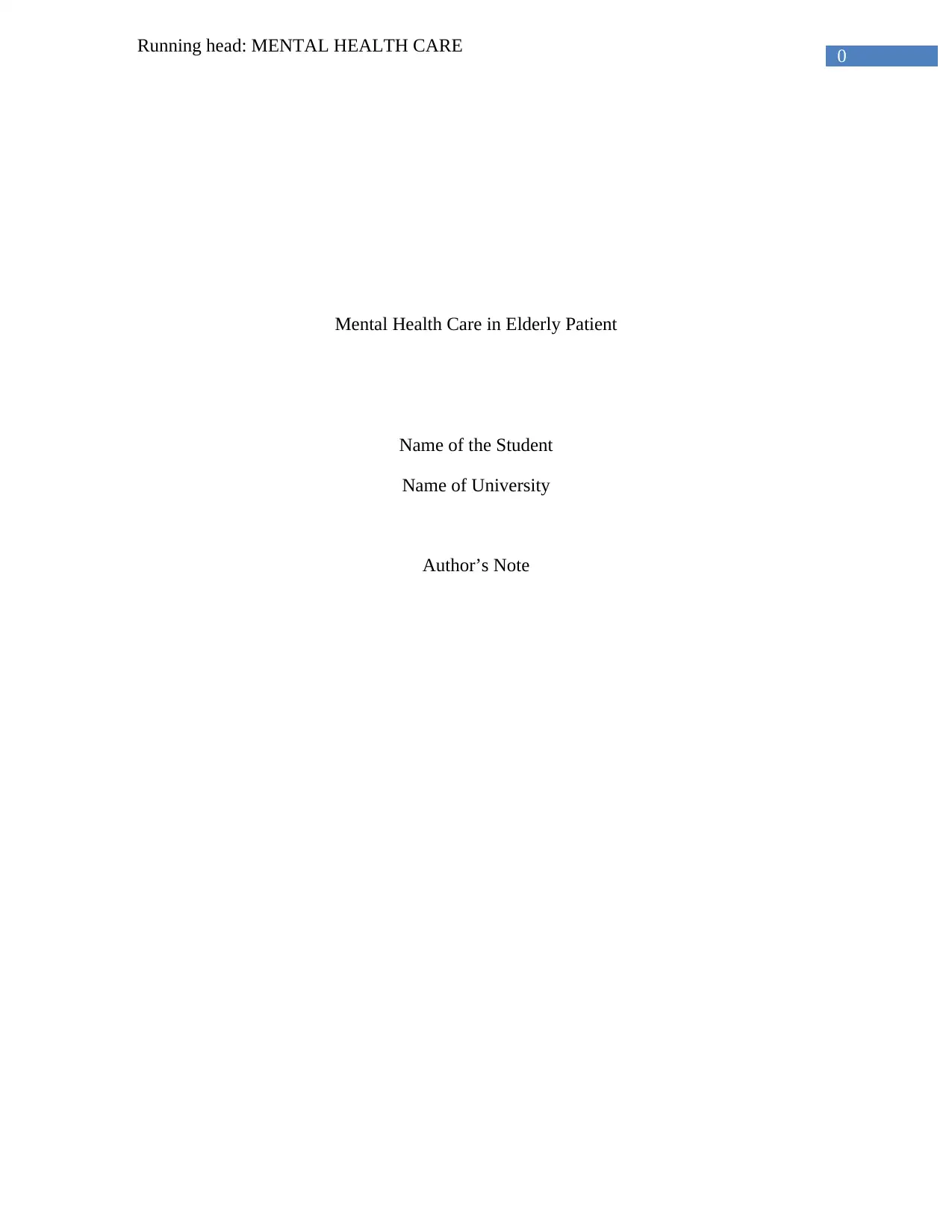
0
Running head: MENTAL HEALTH CARE
Mental Health Care in Elderly Patient
Name of the Student
Name of University
Author’s Note
Running head: MENTAL HEALTH CARE
Mental Health Care in Elderly Patient
Name of the Student
Name of University
Author’s Note
Paraphrase This Document
Need a fresh take? Get an instant paraphrase of this document with our AI Paraphraser
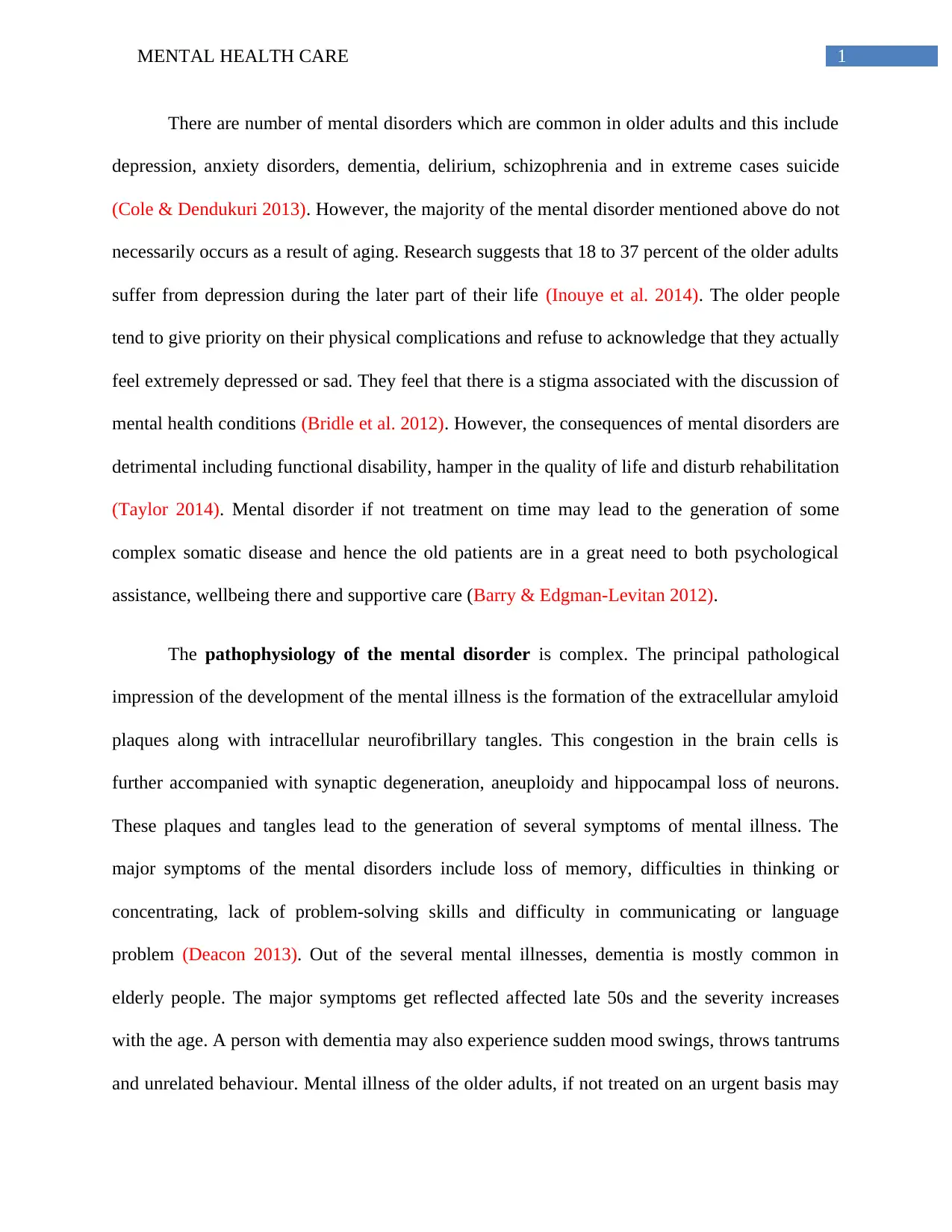
1MENTAL HEALTH CARE
There are number of mental disorders which are common in older adults and this include
depression, anxiety disorders, dementia, delirium, schizophrenia and in extreme cases suicide
(Cole & Dendukuri 2013). However, the majority of the mental disorder mentioned above do not
necessarily occurs as a result of aging. Research suggests that 18 to 37 percent of the older adults
suffer from depression during the later part of their life (Inouye et al. 2014). The older people
tend to give priority on their physical complications and refuse to acknowledge that they actually
feel extremely depressed or sad. They feel that there is a stigma associated with the discussion of
mental health conditions (Bridle et al. 2012). However, the consequences of mental disorders are
detrimental including functional disability, hamper in the quality of life and disturb rehabilitation
(Taylor 2014). Mental disorder if not treatment on time may lead to the generation of some
complex somatic disease and hence the old patients are in a great need to both psychological
assistance, wellbeing there and supportive care (Barry & Edgman-Levitan 2012).
The pathophysiology of the mental disorder is complex. The principal pathological
impression of the development of the mental illness is the formation of the extracellular amyloid
plaques along with intracellular neurofibrillary tangles. This congestion in the brain cells is
further accompanied with synaptic degeneration, aneuploidy and hippocampal loss of neurons.
These plaques and tangles lead to the generation of several symptoms of mental illness. The
major symptoms of the mental disorders include loss of memory, difficulties in thinking or
concentrating, lack of problem-solving skills and difficulty in communicating or language
problem (Deacon 2013). Out of the several mental illnesses, dementia is mostly common in
elderly people. The major symptoms get reflected affected late 50s and the severity increases
with the age. A person with dementia may also experience sudden mood swings, throws tantrums
and unrelated behaviour. Mental illness of the older adults, if not treated on an urgent basis may
There are number of mental disorders which are common in older adults and this include
depression, anxiety disorders, dementia, delirium, schizophrenia and in extreme cases suicide
(Cole & Dendukuri 2013). However, the majority of the mental disorder mentioned above do not
necessarily occurs as a result of aging. Research suggests that 18 to 37 percent of the older adults
suffer from depression during the later part of their life (Inouye et al. 2014). The older people
tend to give priority on their physical complications and refuse to acknowledge that they actually
feel extremely depressed or sad. They feel that there is a stigma associated with the discussion of
mental health conditions (Bridle et al. 2012). However, the consequences of mental disorders are
detrimental including functional disability, hamper in the quality of life and disturb rehabilitation
(Taylor 2014). Mental disorder if not treatment on time may lead to the generation of some
complex somatic disease and hence the old patients are in a great need to both psychological
assistance, wellbeing there and supportive care (Barry & Edgman-Levitan 2012).
The pathophysiology of the mental disorder is complex. The principal pathological
impression of the development of the mental illness is the formation of the extracellular amyloid
plaques along with intracellular neurofibrillary tangles. This congestion in the brain cells is
further accompanied with synaptic degeneration, aneuploidy and hippocampal loss of neurons.
These plaques and tangles lead to the generation of several symptoms of mental illness. The
major symptoms of the mental disorders include loss of memory, difficulties in thinking or
concentrating, lack of problem-solving skills and difficulty in communicating or language
problem (Deacon 2013). Out of the several mental illnesses, dementia is mostly common in
elderly people. The major symptoms get reflected affected late 50s and the severity increases
with the age. A person with dementia may also experience sudden mood swings, throws tantrums
and unrelated behaviour. Mental illness of the older adults, if not treated on an urgent basis may
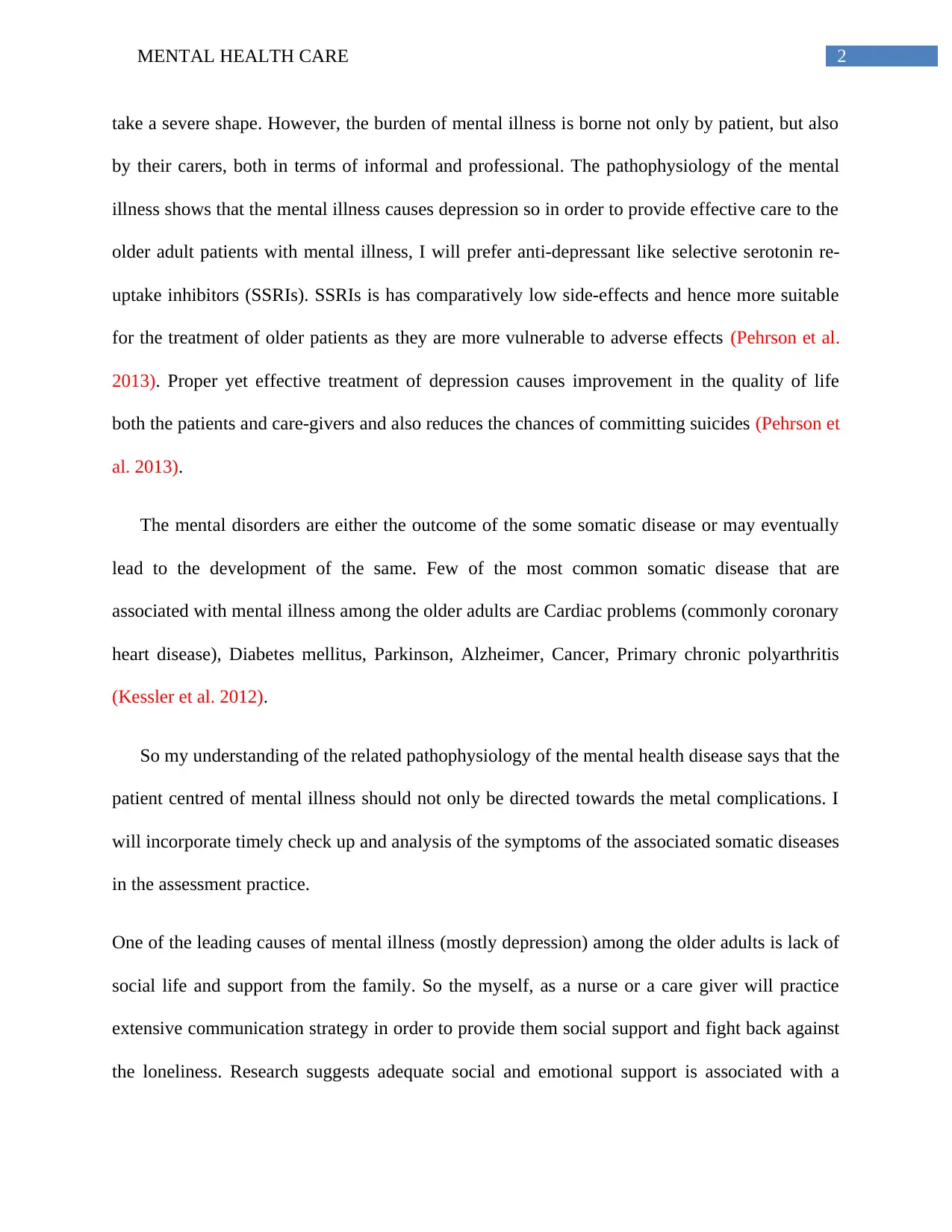
2MENTAL HEALTH CARE
take a severe shape. However, the burden of mental illness is borne not only by patient, but also
by their carers, both in terms of informal and professional. The pathophysiology of the mental
illness shows that the mental illness causes depression so in order to provide effective care to the
older adult patients with mental illness, I will prefer anti-depressant like selective serotonin re-
uptake inhibitors (SSRIs). SSRIs is has comparatively low side-effects and hence more suitable
for the treatment of older patients as they are more vulnerable to adverse effects (Pehrson et al.
2013). Proper yet effective treatment of depression causes improvement in the quality of life
both the patients and care-givers and also reduces the chances of committing suicides (Pehrson et
al. 2013).
The mental disorders are either the outcome of the some somatic disease or may eventually
lead to the development of the same. Few of the most common somatic disease that are
associated with mental illness among the older adults are Cardiac problems (commonly coronary
heart disease), Diabetes mellitus, Parkinson, Alzheimer, Cancer, Primary chronic polyarthritis
(Kessler et al. 2012).
So my understanding of the related pathophysiology of the mental health disease says that the
patient centred of mental illness should not only be directed towards the metal complications. I
will incorporate timely check up and analysis of the symptoms of the associated somatic diseases
in the assessment practice.
One of the leading causes of mental illness (mostly depression) among the older adults is lack of
social life and support from the family. So the myself, as a nurse or a care giver will practice
extensive communication strategy in order to provide them social support and fight back against
the loneliness. Research suggests adequate social and emotional support is associated with a
take a severe shape. However, the burden of mental illness is borne not only by patient, but also
by their carers, both in terms of informal and professional. The pathophysiology of the mental
illness shows that the mental illness causes depression so in order to provide effective care to the
older adult patients with mental illness, I will prefer anti-depressant like selective serotonin re-
uptake inhibitors (SSRIs). SSRIs is has comparatively low side-effects and hence more suitable
for the treatment of older patients as they are more vulnerable to adverse effects (Pehrson et al.
2013). Proper yet effective treatment of depression causes improvement in the quality of life
both the patients and care-givers and also reduces the chances of committing suicides (Pehrson et
al. 2013).
The mental disorders are either the outcome of the some somatic disease or may eventually
lead to the development of the same. Few of the most common somatic disease that are
associated with mental illness among the older adults are Cardiac problems (commonly coronary
heart disease), Diabetes mellitus, Parkinson, Alzheimer, Cancer, Primary chronic polyarthritis
(Kessler et al. 2012).
So my understanding of the related pathophysiology of the mental health disease says that the
patient centred of mental illness should not only be directed towards the metal complications. I
will incorporate timely check up and analysis of the symptoms of the associated somatic diseases
in the assessment practice.
One of the leading causes of mental illness (mostly depression) among the older adults is lack of
social life and support from the family. So the myself, as a nurse or a care giver will practice
extensive communication strategy in order to provide them social support and fight back against
the loneliness. Research suggests adequate social and emotional support is associated with a
⊘ This is a preview!⊘
Do you want full access?
Subscribe today to unlock all pages.

Trusted by 1+ million students worldwide
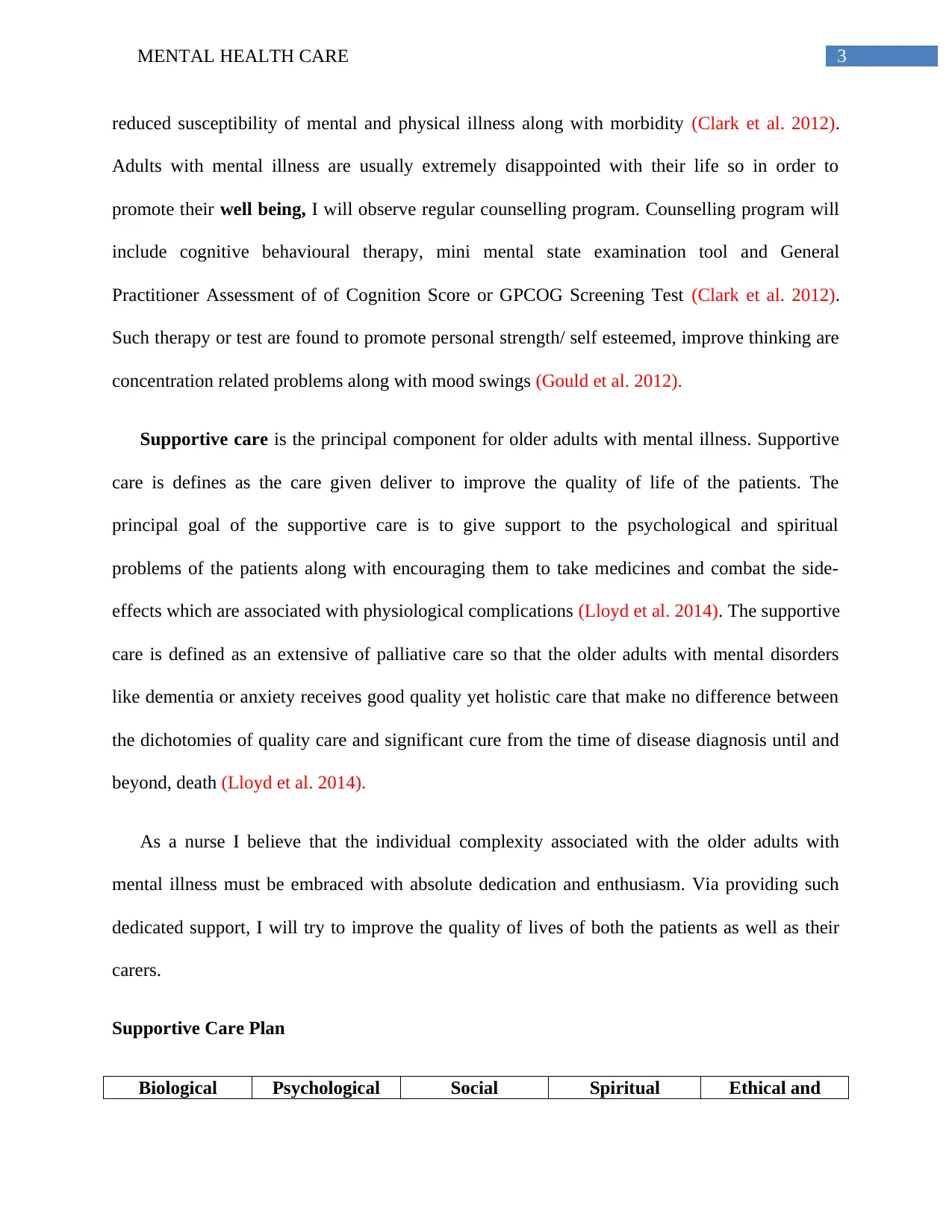
3MENTAL HEALTH CARE
reduced susceptibility of mental and physical illness along with morbidity (Clark et al. 2012).
Adults with mental illness are usually extremely disappointed with their life so in order to
promote their well being, I will observe regular counselling program. Counselling program will
include cognitive behavioural therapy, mini mental state examination tool and General
Practitioner Assessment of of Cognition Score or GPCOG Screening Test (Clark et al. 2012).
Such therapy or test are found to promote personal strength/ self esteemed, improve thinking are
concentration related problems along with mood swings (Gould et al. 2012).
Supportive care is the principal component for older adults with mental illness. Supportive
care is defines as the care given deliver to improve the quality of life of the patients. The
principal goal of the supportive care is to give support to the psychological and spiritual
problems of the patients along with encouraging them to take medicines and combat the side-
effects which are associated with physiological complications (Lloyd et al. 2014). The supportive
care is defined as an extensive of palliative care so that the older adults with mental disorders
like dementia or anxiety receives good quality yet holistic care that make no difference between
the dichotomies of quality care and significant cure from the time of disease diagnosis until and
beyond, death (Lloyd et al. 2014).
As a nurse I believe that the individual complexity associated with the older adults with
mental illness must be embraced with absolute dedication and enthusiasm. Via providing such
dedicated support, I will try to improve the quality of lives of both the patients as well as their
carers.
Supportive Care Plan
Biological Psychological Social Spiritual Ethical and
reduced susceptibility of mental and physical illness along with morbidity (Clark et al. 2012).
Adults with mental illness are usually extremely disappointed with their life so in order to
promote their well being, I will observe regular counselling program. Counselling program will
include cognitive behavioural therapy, mini mental state examination tool and General
Practitioner Assessment of of Cognition Score or GPCOG Screening Test (Clark et al. 2012).
Such therapy or test are found to promote personal strength/ self esteemed, improve thinking are
concentration related problems along with mood swings (Gould et al. 2012).
Supportive care is the principal component for older adults with mental illness. Supportive
care is defines as the care given deliver to improve the quality of life of the patients. The
principal goal of the supportive care is to give support to the psychological and spiritual
problems of the patients along with encouraging them to take medicines and combat the side-
effects which are associated with physiological complications (Lloyd et al. 2014). The supportive
care is defined as an extensive of palliative care so that the older adults with mental disorders
like dementia or anxiety receives good quality yet holistic care that make no difference between
the dichotomies of quality care and significant cure from the time of disease diagnosis until and
beyond, death (Lloyd et al. 2014).
As a nurse I believe that the individual complexity associated with the older adults with
mental illness must be embraced with absolute dedication and enthusiasm. Via providing such
dedicated support, I will try to improve the quality of lives of both the patients as well as their
carers.
Supportive Care Plan
Biological Psychological Social Spiritual Ethical and
Paraphrase This Document
Need a fresh take? Get an instant paraphrase of this document with our AI Paraphraser

4MENTAL HEALTH CARE
Legal
Quality treatment
based on the
geneticback up
of the disease
(Cotelli et al.
2012)
Proper genetic
counselling
(Cotelli et al.
2012)
Extensive review
of the lifestyle
factors
Proper
acknowledgement
and support
towards the
spiritual thoughts
(Cotelli et al. 2012)
Focus on the
person oriented
care centre
(Cotelli et al.
2012)
Reduction of the
biological risk
factors
associated with
mental health
like
cardiovascular
disease (Cotelli et
al. 2012)
Proper emotional
support to the
patient suffering
from depression
and dementia
(Cotelli et al.
2012)
Review and
analysis of the
environmental
risk factors such
as risk associated
with wandering
behaviour
(Cotelli et al.
2012)
Help in observing
specific religious
practices (Cotelli
et al. 2012)
Giving proper
medical
diagnosis (Cotelli
et al. 2012)
Thus from the above essay it can be concluded that mental health disorders among the
older adults is not majorly due to the physical complication and often remains untreated or
unrecognised. I as a nurse in the elderly care domain will promote the strategy of supportive
care, well being care to improve the overall mental health backup of these patients. Moreover, I
will also take the pathophysiology into consideration to treat or handle the disease accordingly.
Legal
Quality treatment
based on the
geneticback up
of the disease
(Cotelli et al.
2012)
Proper genetic
counselling
(Cotelli et al.
2012)
Extensive review
of the lifestyle
factors
Proper
acknowledgement
and support
towards the
spiritual thoughts
(Cotelli et al. 2012)
Focus on the
person oriented
care centre
(Cotelli et al.
2012)
Reduction of the
biological risk
factors
associated with
mental health
like
cardiovascular
disease (Cotelli et
al. 2012)
Proper emotional
support to the
patient suffering
from depression
and dementia
(Cotelli et al.
2012)
Review and
analysis of the
environmental
risk factors such
as risk associated
with wandering
behaviour
(Cotelli et al.
2012)
Help in observing
specific religious
practices (Cotelli
et al. 2012)
Giving proper
medical
diagnosis (Cotelli
et al. 2012)
Thus from the above essay it can be concluded that mental health disorders among the
older adults is not majorly due to the physical complication and often remains untreated or
unrecognised. I as a nurse in the elderly care domain will promote the strategy of supportive
care, well being care to improve the overall mental health backup of these patients. Moreover, I
will also take the pathophysiology into consideration to treat or handle the disease accordingly.
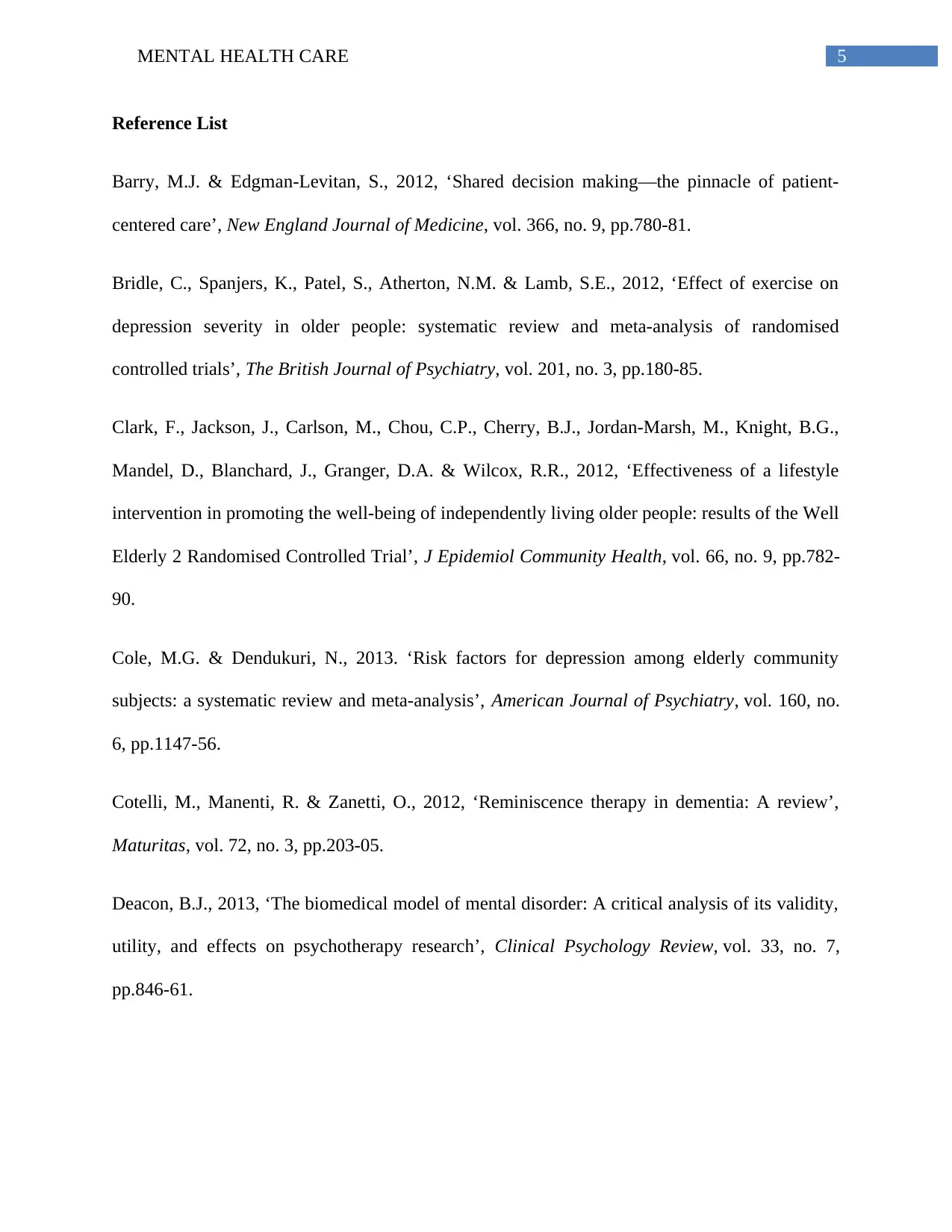
5MENTAL HEALTH CARE
Reference List
Barry, M.J. & Edgman-Levitan, S., 2012, ‘Shared decision making—the pinnacle of patient-
centered care’, New England Journal of Medicine, vol. 366, no. 9, pp.780-81.
Bridle, C., Spanjers, K., Patel, S., Atherton, N.M. & Lamb, S.E., 2012, ‘Effect of exercise on
depression severity in older people: systematic review and meta-analysis of randomised
controlled trials’, The British Journal of Psychiatry, vol. 201, no. 3, pp.180-85.
Clark, F., Jackson, J., Carlson, M., Chou, C.P., Cherry, B.J., Jordan-Marsh, M., Knight, B.G.,
Mandel, D., Blanchard, J., Granger, D.A. & Wilcox, R.R., 2012, ‘Effectiveness of a lifestyle
intervention in promoting the well-being of independently living older people: results of the Well
Elderly 2 Randomised Controlled Trial’, J Epidemiol Community Health, vol. 66, no. 9, pp.782-
90.
Cole, M.G. & Dendukuri, N., 2013. ‘Risk factors for depression among elderly community
subjects: a systematic review and meta-analysis’, American Journal of Psychiatry, vol. 160, no.
6, pp.1147-56.
Cotelli, M., Manenti, R. & Zanetti, O., 2012, ‘Reminiscence therapy in dementia: A review’,
Maturitas, vol. 72, no. 3, pp.203-05.
Deacon, B.J., 2013, ‘The biomedical model of mental disorder: A critical analysis of its validity,
utility, and effects on psychotherapy research’, Clinical Psychology Review, vol. 33, no. 7,
pp.846-61.
Reference List
Barry, M.J. & Edgman-Levitan, S., 2012, ‘Shared decision making—the pinnacle of patient-
centered care’, New England Journal of Medicine, vol. 366, no. 9, pp.780-81.
Bridle, C., Spanjers, K., Patel, S., Atherton, N.M. & Lamb, S.E., 2012, ‘Effect of exercise on
depression severity in older people: systematic review and meta-analysis of randomised
controlled trials’, The British Journal of Psychiatry, vol. 201, no. 3, pp.180-85.
Clark, F., Jackson, J., Carlson, M., Chou, C.P., Cherry, B.J., Jordan-Marsh, M., Knight, B.G.,
Mandel, D., Blanchard, J., Granger, D.A. & Wilcox, R.R., 2012, ‘Effectiveness of a lifestyle
intervention in promoting the well-being of independently living older people: results of the Well
Elderly 2 Randomised Controlled Trial’, J Epidemiol Community Health, vol. 66, no. 9, pp.782-
90.
Cole, M.G. & Dendukuri, N., 2013. ‘Risk factors for depression among elderly community
subjects: a systematic review and meta-analysis’, American Journal of Psychiatry, vol. 160, no.
6, pp.1147-56.
Cotelli, M., Manenti, R. & Zanetti, O., 2012, ‘Reminiscence therapy in dementia: A review’,
Maturitas, vol. 72, no. 3, pp.203-05.
Deacon, B.J., 2013, ‘The biomedical model of mental disorder: A critical analysis of its validity,
utility, and effects on psychotherapy research’, Clinical Psychology Review, vol. 33, no. 7,
pp.846-61.
⊘ This is a preview!⊘
Do you want full access?
Subscribe today to unlock all pages.

Trusted by 1+ million students worldwide
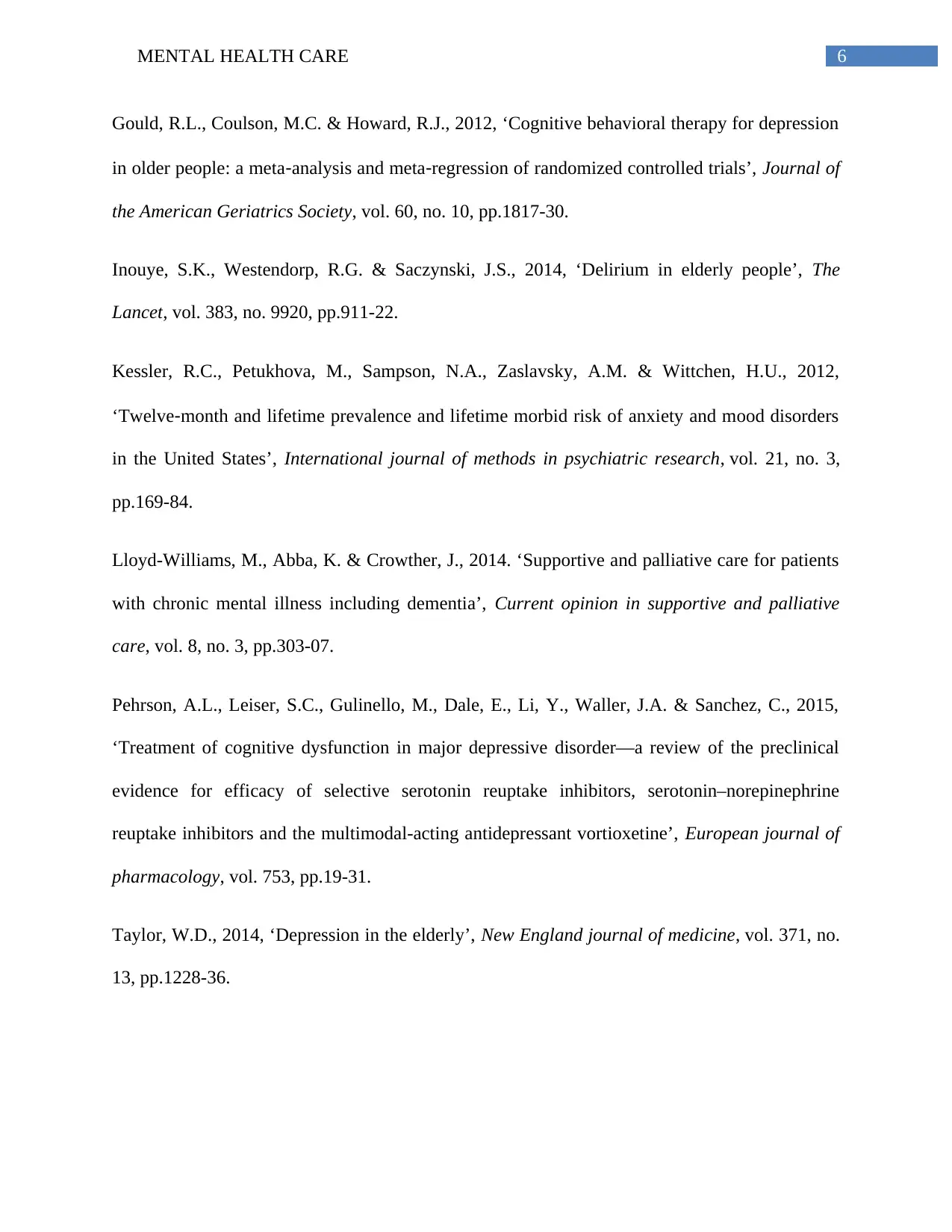
6MENTAL HEALTH CARE
Gould, R.L., Coulson, M.C. & Howard, R.J., 2012, ‘Cognitive behavioral therapy for depression
in older people: a meta‐analysis and meta‐regression of randomized controlled trials’, Journal of
the American Geriatrics Society, vol. 60, no. 10, pp.1817-30.
Inouye, S.K., Westendorp, R.G. & Saczynski, J.S., 2014, ‘Delirium in elderly people’, The
Lancet, vol. 383, no. 9920, pp.911-22.
Kessler, R.C., Petukhova, M., Sampson, N.A., Zaslavsky, A.M. & Wittchen, H.U., 2012,
‘Twelve‐month and lifetime prevalence and lifetime morbid risk of anxiety and mood disorders
in the United States’, International journal of methods in psychiatric research, vol. 21, no. 3,
pp.169-84.
Lloyd-Williams, M., Abba, K. & Crowther, J., 2014. ‘Supportive and palliative care for patients
with chronic mental illness including dementia’, Current opinion in supportive and palliative
care, vol. 8, no. 3, pp.303-07.
Pehrson, A.L., Leiser, S.C., Gulinello, M., Dale, E., Li, Y., Waller, J.A. & Sanchez, C., 2015,
‘Treatment of cognitive dysfunction in major depressive disorder—a review of the preclinical
evidence for efficacy of selective serotonin reuptake inhibitors, serotonin–norepinephrine
reuptake inhibitors and the multimodal-acting antidepressant vortioxetine’, European journal of
pharmacology, vol. 753, pp.19-31.
Taylor, W.D., 2014, ‘Depression in the elderly’, New England journal of medicine, vol. 371, no.
13, pp.1228-36.
Gould, R.L., Coulson, M.C. & Howard, R.J., 2012, ‘Cognitive behavioral therapy for depression
in older people: a meta‐analysis and meta‐regression of randomized controlled trials’, Journal of
the American Geriatrics Society, vol. 60, no. 10, pp.1817-30.
Inouye, S.K., Westendorp, R.G. & Saczynski, J.S., 2014, ‘Delirium in elderly people’, The
Lancet, vol. 383, no. 9920, pp.911-22.
Kessler, R.C., Petukhova, M., Sampson, N.A., Zaslavsky, A.M. & Wittchen, H.U., 2012,
‘Twelve‐month and lifetime prevalence and lifetime morbid risk of anxiety and mood disorders
in the United States’, International journal of methods in psychiatric research, vol. 21, no. 3,
pp.169-84.
Lloyd-Williams, M., Abba, K. & Crowther, J., 2014. ‘Supportive and palliative care for patients
with chronic mental illness including dementia’, Current opinion in supportive and palliative
care, vol. 8, no. 3, pp.303-07.
Pehrson, A.L., Leiser, S.C., Gulinello, M., Dale, E., Li, Y., Waller, J.A. & Sanchez, C., 2015,
‘Treatment of cognitive dysfunction in major depressive disorder—a review of the preclinical
evidence for efficacy of selective serotonin reuptake inhibitors, serotonin–norepinephrine
reuptake inhibitors and the multimodal-acting antidepressant vortioxetine’, European journal of
pharmacology, vol. 753, pp.19-31.
Taylor, W.D., 2014, ‘Depression in the elderly’, New England journal of medicine, vol. 371, no.
13, pp.1228-36.
1 out of 7
Related Documents
Your All-in-One AI-Powered Toolkit for Academic Success.
+13062052269
info@desklib.com
Available 24*7 on WhatsApp / Email
![[object Object]](/_next/static/media/star-bottom.7253800d.svg)
Unlock your academic potential
Copyright © 2020–2026 A2Z Services. All Rights Reserved. Developed and managed by ZUCOL.





